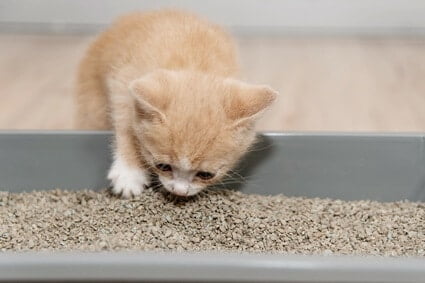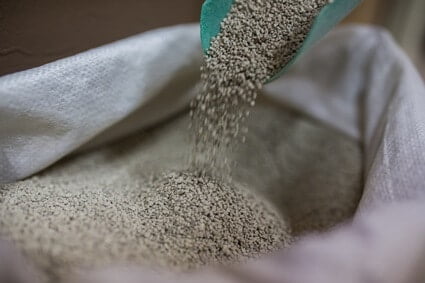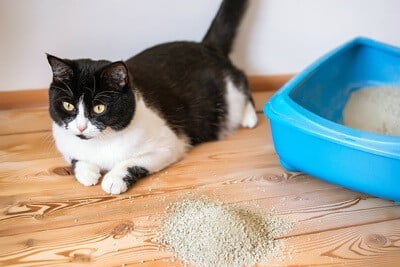Mammals like cats can develop an allergic reaction to things they breathe in, eat, or touch. When it comes to litter allergy, behavioral cues provide a clearer picture.
A cat has a litter allergy if it always avoids using its box. It may constantly scratch, cough, have rashes, or patchy fur due to scratching. It may groom incessantly, be in a bad mood, and mess elsewhere for no clear reason. Also, it may have watery eyes, sneeze, and have swelling around the face.
If your cat is extra sensitive, you can switch to a hypoallergenic litter such as walnut, pine, wood, corn, wheat, and other low-dust, natural litters. While your cat may still react to these, the likelihood is lower. You can keep testing different kinds of litter until your cat stops reacting.
Can Cats Become Allergic To Litter?
Cats can develop an allergy to their litter, or they may be born with an allergy that becomes apparent over time. That’s because the cause of allergies is the same for humans and cats alike.
The body’s response to an outside irritant leads to discomfort. At times, this is the body’s overreaction, while other times, it’s a natural defense to a foreign body that’s irritating the system.
According to Clinical and Translational Allergy, cat litter allergies are often a form of atopic dermatitis. There’s no medical way to stop the allergic reaction to kitty litter.
Instead, you need to switch to a different type of cat litter that your cat’s not allergic to.
Cat Litter Allergy Symptoms
A cat’s allergic reaction to kitty litter may be physical, behavioral, or both.
For example, some cats only react with itchiness and sneezing. Others don’t show these symptoms but persistently avoid their litter box and become grumpy.
For some cats, they may even develop a lack of appetite and diarrhea due to indigestion, brought on by an unwillingness to use their litter box.
Here are signs your cat is allergic to litter:
- Rashes around the butt or paws
- Coughing
- Avoiding the litter box, or suddenly messing elsewhere
- Sneezing
- Scratching excessively
- Patchy fur as a result of scratching or rashes
- Watery eyes
- Swelling around the face
- Meowing loudly after using its tray
These symptoms can appear suddenly, or they can develop slowly over time. Often, symptoms compound with one another the longer the cat is exposed to the problematic litter.
Cats will likely determine that the discomfort is paired with using the litter box. So, your cat may not develop symptoms as it’ll refuse to use the litter box at all costs.
If that’s the case, your feline is merely handling the allergy in its own way. You can test this by changing to a new type of litter and seeing if your cat chooses to use its box again.
Hypoallergenic Cat Litter for Cats with Allergies
When choosing the right litter for a cat with allergies, you have a range of brands and styles to choose from. You can pick whichever works ideally for your budget and preferences.
What cat litter is best for cats with allergies? Just ensure it ticks these boxes, so it qualifies as properly hypoallergenic and won’t bother your allergic cat:
- Low-dust: It’s often the dust that triggers the allergy, so limiting this will be beneficial.
- Clumping litter: This is often entailed with low-dust options, but helps to contain your cat’s messes and keep small particles from the litter from getting trapped in your feline’s coat.
- Natural ingredients: The fewer artificial ingredients or chemicals, the better. You can find litters made from minerals like walnut, as well as corn, pine, or wheat.
- Types branded as allergy-free: This is designed for cats that are more sensitive.
- Human-safe: Humans tend to be more sensitive to allergens than cats, so if it’s branded to accommodate people, it’s more likely to help your cat out too.
The types that usually meet these marks are those made with natural ingredients. These are often in pellet form to keep things tidy and encourage clumping.
The best options include the following:
- Corn
- Wheat
- Pine
- Walnut
- Other woods

Can Cats Be Allergic To Corn Litter?
Corn litter is often the hypoallergenic solution, so it seems counterproductive that some cats are allergic to it. In truth, this is rare, but it does happen. Mostly, it’s to do with mold that grows on the corn during production. Your cat is allergic to mold, not corn.
While growing, corn may become a host for aflatoxin mold. Once it’s harvested and processed, this should be fully removed. After all, the processing entails drying, grinding, and steps to preserve it and turn it into cat litter. However, there are times when the toxin survives.
According to Toxin Reviews, aflatoxin can be harmful to cats, leading to skin conditions, blood conditions, gastrointestinal issues, and diseases. The early signs are often skin irritation, which can be attributed to an allergy. Fortunately, the effects only take place after prolonged exposure.
It’s rare for aflatoxin mold to make its way through the manufacturing process. You may have one bag of litter that causes a reaction in your cat, and then it never experiences it again.
If you want to be safe, remove all the litter the cat has reacted to and try a new bag. Also, you can switch to a different brand if you want to be extra safe.
Can Cats Be Allergic To Pine Litter?
Though uncommon, some cats can develop an allergy to pine litter.
This is often characterized by breathing difficulties, coughing, and sneezing. Also, you may find itchiness develops in your cat, causing it to scratch profusely.
If you notice this, your cat has a pine allergy and should be given a different litter. For most cats, pine litter is hypoallergenic, as it reduces the chances of breathing difficulties since it’s extremely low dust.
Can Cats Be Allergic To Walnut Litter?
If your cat has a nut allergy, it may react to walnut litter.
As with other hypoallergenic litters, this is rare but can happen. You’ll know your cat is allergic to walnut litter if it develops severe itchiness and begins scratching regularly.
This will be heaviest in areas where the litter has made contact, such as around the paws and backside. The itchiness may spread as the cat grooms itself with its paws.
However, since it’s low-dust, walnut litter shouldn’t easily come into contact with the rest of the cat’s body. If you suspect your cat is allergic to nuts, avoid walnut litter.
Can Cats Be Allergic To Clay Litter?
Clay is a more common type of litter for cats to be allergic to because it’s often mixed with bentonite, silica dust, and other chemicals that work as binders.
It has a higher dust content for this reason. If you notice your cat scratching or coughing after using its clay litter, consider switching to another type.
Can Cats Be Allergic To Wheat Litter?
As with corn litter, it’s rare for cats to be allergic to wheat litter.
This is often a top choice for hypoallergenic varieties that aid sickly, sensitive, or recovering felines. However, there are times when it can trigger an allergic reaction.
Once again, this happens if the aflatoxin mold is present in the wheat litter. It can result in coughing, digestive issues, and rashes on your cat.
The good news is that it rarely makes it past production, so it’s unlikely for your cat to ever encounter it.

Can Cats Be Allergic To Scented Litter?
Fragrances are one of the most common sources of allergic reactions in cats because the scents are often developed from artificial chemicals, which your cat’s skin and lungs may not be equipped to handle.
If your cat has any sensitivity at all, avoid fragrance-heavy litters. If your cat starts avoiding its litter box altogether, this may be the reason and should motivate you to switch to a different kind.
Can Cats Be Allergic To Wood Litter?
As with pine, cats are unlikely to be allergic to wood litter in general.
However, there are times when pollen, mold, dust, and mildew make it through the production of this type of litter. Your cat may have a sensitivity to this, which may trigger an allergic reaction.
This is more common if you don’t change out the wood litter regularly. It’ll be more prone to growing mold, hosting bacteria, and developing a host of organisms.
Your cat may then react to this. That makes it wise to change the wood litter regularly and switch to a new brand if you notice your cat having unfavorable reactions to it.
Can Cats Be Allergic To Kitty Litter?
Cats can become allergic to kitty litter, but this isn’t true for every cat.
Some will go their entire lives, switching from type to type and brand to brand, without issue. Others will have specific needs and require hypoallergenic litter to be happy. Others will even have allergic reactions to allergy-preventing litter and need further help options.
Cats develop litter allergies for reasons that are unique to each animal. The key is to narrow down what your cat is allergic to, not the litter as a whole.
Some cats develop an allergic reaction to the artificial fragrance used in a specific litter, while others have shown allergic symptoms due to the dust in their litter.
Some ingredients can act as an irritant to cats. For instance, sodium bentonite is a clay commonly used as an ingredient. This clay consists of a mineral called silica, which produces fine silica dust when you pour the litter on the tray. Inhaling this dust can lead to an allergic reaction in some cats.
The best response is to use a different kind of litter, which should see the symptoms resolving themselves and your cat returning to normal.


My 12 year old female cat has licked almost all the fur off her belly. Could she be allergic to the cat litter that I am using? How can you tell if it is the litter or something else without going to the vet?